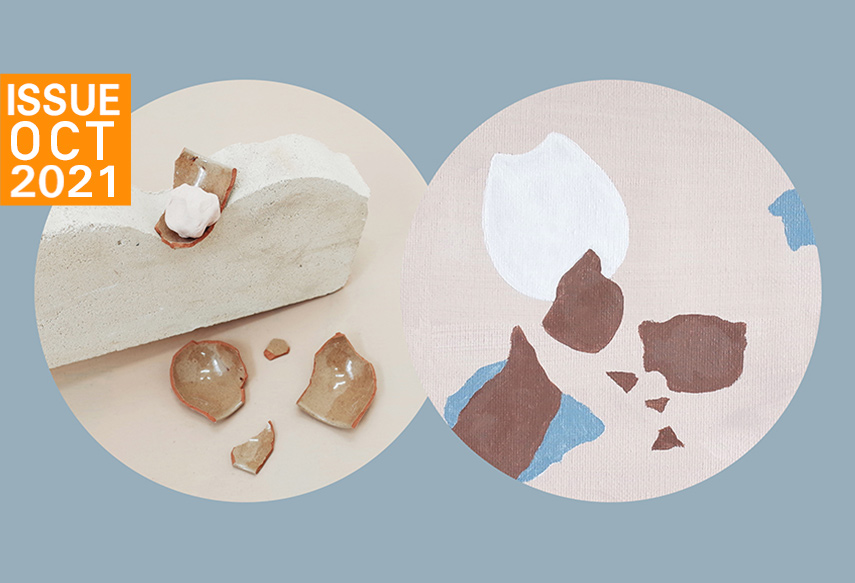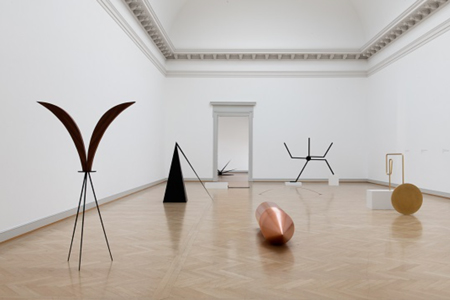- Featuring
- Octavio Paz
- Tania Candiani
- Sara Stridsberg
- Wolfgang Cordan
- Bedouin Oral Poetry Marian Schwartz on Nina Berberova
We’ve been producing enough of these issues that it was bound to happen sooner or later: a thematic evil twin. Hear me out. Back in Fall 2015, Alberto Chimal gave us a light-footed time traveler “who dreams a ‘flashforward’ in which he awoke, traveled backwards in time, slept, and dreamt a ‘flashforward.’” Six years on, alongside new work from 30 countries, the Bengali essayist Akhteruzzaman Elias describes “wheezing, helpless, walled within [his] time.” When he looks over the partition, he only sees “immense, endless time.”
Not yet fully the other side of a pandemic, time is as painfully distended for many of the narrators in this issue as it has been for us. With Jakuba Katalpa and Wolfgang Cordan, in particular, revisiting dark chapters in recent human history (don’t miss Klein Voorhees’s devastating translator’s note that turns a seemingly romantic poem into a downright sinister one), it was a deliberate choice to bookend the Fiction and Poetry sections with Patrizia Cavalli’s irrepressibly joyful “Dancing Shoes” and Ricardo Zelarayán’s thrilling narrative poem “The Great Salt Flats.” Kim Bo-Young’s I’m Waiting for You, reviewed with gusto by Cristy Stiles, sets actual time travelers in endlessly inventive scenarios, but still manages to pull off “romantic and optimistic”—possibly the perfect escapist read for our times. In Brave New World Literature, Jacques Derrida and Lila Abu-Lughod help Caitlin Woolsey understand her encounter, at age twenty-one, with the timeless Bedouin oral tradition of Jordan’s people. Elsewhere, in Drama, Anna Carlier transports us to a future ecological nightmare, where “half the world is drying up” and “the other half . . . drowning,” with no way to tell if the clock is “counting up or . . . down.” All is illustrated by the brilliant photographer Switzerland / Singapore-based Genevieve Leong.
We’re especially thrilled to host José Luis Perdomo’s 1994 interview with Octavio Paz on the eve of the Nobel laureate’s eightieth birthday—made available in English for the first time by our very own José García Escobar—itself a “resurrection of presence.” Just as special is translator Marian Schwartz on her literary touchstone—the brilliant Russian émigré writer Nina Berberova. In a generous interview she gave to Assistant Managing Editor Janet Phillips and me, Schwartz explains what Berberova was up against as a woman writer refusing to play the stereotype of The Great Man’s Wife, and why she deserves to be read today.
When an application for a sponsored feature fell through unexpectedly at the last minute despite dangled promises, it was Schwartz’s comment about the greater role played by foreign cultural agencies in the past decade that inspired me to reach out to institutional advocates to ask if they might demystify their inner workings. Would they answer the same set of ten questions I would send to all of them? I only had one condition: someone had to be the face of the organization for each interview. In the end, Russia’s Institute for Literary Translation, the Lithuanian Cultural Institute, Catalan Culture’s Institut Ramon Llull, and the Literature Translation Institute of Korea agreed to take questions (while the National Arts Council of Singapore, where Asymptote is incorporated, in view of our impasse perhaps, predictably declined). The result is a fascinating cross-cultural snapshot of the role of an otherwise mostly invisible player in world literature. We hope to do more in 2022 (so if you are an institutional advocate looking to promote your work—or your country’s literature—to our 80K monthly readers, get in touch!). In fact, a freshly-inked partnership with Flanders Literature will already see a paid Flemish Literature Special Feature in January 2022, which means translators working with Dutch should check out our new submission call and start polishing their translations!
Not a translator from the Dutch or even a translator? We invite work all year round—as you would know if you signed up for our newsletters—and would especially love to read Brave New World Literature essay submissions (guidelines here). There are also other ways to support our mission from helping to spread the word—on Facebook, Twitter, and our two Instagram accounts—and taking out an ad with us to joining the magazine via our final recruitment drive of the year (deadline to apply: November 1); we’re on the lookout for copy editors, social media managers, graphic designers, assistant managing editors, and even guest artists. If you’re racking your brain for the perfect gift as we approach the year-end season, consider sending your loved one a three-month or one-year Asymptote Book Club subscription—we’ll even include a personalized note if you would like one with the first book. Can we tell you a secret? Despite talk of #TheGreatResignation, we have kept pressing on through this difficult year without ongoing institutional support because we believe in the value our journal holds for the international literary community. Answer our commitment with a one-time donation or, even better, a pledge of support in the form of a sustaining or masthead membership. Whether today or on #GivingTuesday (November 30), we’d be so thrilled if you could support us. Thank you for reading us for yet another year.
—Lee Yew Leong, Editor-in-Chief
Editorial Team for Issue October 2021
Editor-in-Chief: Lee Yew Leong (Taiwan/Singapore)
Assistant Managing Editors: Daljinder Johal (UK/India), Marina Martino (UK), Samuel Miller (Portugal/USA), Janet Phillips (UK/Australia), and Lindsay Semel (Portugal/USA)
Section Editors:
Lee Yew Leong (Taiwan/Singapore)
Bassam Sidiki (USA/Pakistan)
Caridad Svich (USA/UK)
Sam Carter (USA)
Barbara Halla (Albania)
Eva Heisler (Germany/USA)
Editor of Special Feature “Institutional Advocates Take Questions”: Lee Yew Leong (Taiwan/Singapore)
Assistant Editors: Alyea Canada (USA), Whitney DeVos (Mexico/USA), Sabrina Greene (USA), Jaedyn Hedman (USA), Shawn Hoo (Singapore), Gabriela Lemos (USA), M.L. Martin (Canada), Maya Nguen (USA), Andreea Scridon (UK/Romania), Megan Sungyoon (South Korea), Fairuza Hanun Razak (Indonesia), Alex Tan (Singapore), Laurel Taylor (Japan/USA), and Lin Chia-wei (Taiwan)
Contributing Editors: Ellen Elias-Bursac (USA), Aamer Hussein (UK), Sim Yee Chiang (Singapore), Dylan Suher (USA), and Adrian West (USA)
Translation Tuesdays Editor: Shawn Hoo (Singapore)
Art Director: Lee Yew Leong (Taiwan/Singapore)
Director, Educational Arm: Kent Kosack (USA)
Editor-at-large, El Salvador: Nestor Gomez
Editor-at-large, Guatemala: José García
Editors-at-large, Hong Kong: Jacqueline Leung and Charlie Ng Chak-Kwan
Editor-at-large, Japan: David Boyd
Editor-at-large, Lebanon: MK Harb
Editor-at-large, Palestine: Carol Khoury
Editor-at-large, Romania and Moldova: MARGENTO
Editor-at-large, Serbia: Jovanka Kalaba
Editor-at-large, Slovakia: Julia Sherwood
Editor-at-large, Uzbekistan: Filip Noubel
Editor-at-large, Vietnam: Thuy Dinh
Masthead for Issue October 2021
Fiction, Poetry, Special Features, and Interview: Lee Yew Leong
Nonfiction: Bassam Sidiki
Drama: Caridad Svich
Criticism: Sam Carter and Barbara Halla
Visual: Eva Heisler
Illustrations and Cover: Genevieve Leong
Assistant Managing Editor (supervising issue production): Janet Phillips
Assistant Managing Editors (supervising Assistant Editors): Lindsay Semel and Marina Martino
Assistant Managing Editor (supervising Editors-at-Large): Daljinder Johal
Chief Executive Assistant: Rachel Farmer
Senior Executive Assistants: Angela Bulgari, Bernice Seow, and Julie Shi
Blog Editors: Darren Huang, Sarah Moore, and Xiao Yue Shan
Newsletter Editor: Lee Yew Leong
Guest Artist Liaison: Berny Tan
Senior Copy Editors: Anna Aresi, George Macbeth, and Samantha Kirby
Copy Editors: Andrea Blatz, Anna Rumsby, Bella Bosworth, Sophie Hoffman, Rachel Rosenberg, Rachel Stanyon, Maggie Wang, and Eva Wissting
Technical Manager: József Szabó
Director of Outreach: Georgina Fooks
Assistant Director of Outreach: Ka Man Chung
English Social Media: Ruwa Alhayek, Geoffrey Ballinger, Samantha Mateo, and Oliva Roslansky
Spanish Social Media: Sergio Serrano, Sofia Monzó, and Madeline Robinson
French Social Media: Filip Noubel
Chinese Social Media: Jiaoyang Li and Jessica Wang
Graphic Designer: Michael Laungjessadakun
Communications Manager: Julian Strachan
Grant Writer: Julian Thielman
Director, Educational Arm: Kent Kosack
Educational Arm Assistants: Katarzyna Bartoszynska, Lucchini Clémence, Mary Hillis, Thirangie Jayatilake, and Anna Rumsby
Book Club Manager: Alexandra Irimia
Graphic Design Intern: Rachel Tam
Asymptote would like to acknowledge the support especially of: Rosemary Freriks, Maya Osborne, Lucie M. Taylor, Anastasia Kornienko, Marc Dueñas, Lien Devos, Elise Vanoosthuyse, Patrick Peeters, Yannick Geens, and Feroza Jussawalla.
For their generous donations, our heartfelt thanks go too to Anne Berk, Anne-Lise Remacle, Daniel Hahn, Donald Conover, Eric Fishman, Ferran Pericas Cladera, Geoffrey Howes, Harry Leeds, Il Park, Jane Kirby, Jeffrey Boyle, Jenna Colozza, Joachim Redner, Katarzyna Bartoszynska, Mallory Truckenmiller, MARGENTO, Marjolijn de Jager, Mark Cohen, Martin Ingebrigtsen, Matthew Mazowita, Mo O'Mahony, Monty Reid, Nhi Ta Huong, Pavlos Stavropoulos, Sarah Glenski, Sharon Wood, Theresa Henderson, Thomas Carroll, Velina Manolova, and Xiangxiu Meng.



